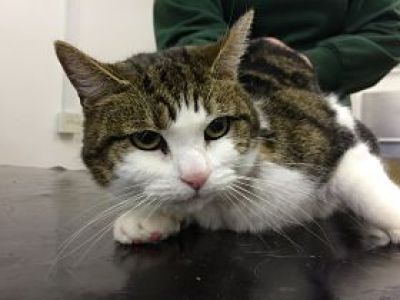
Posted By:
Not all of our patients necessarily make life easy for either us or their owners when they are ill. Amelie the 11 year old cat was one patient that could be put into that category. As a Tortoiseshell cat, she very much believed she could choose her times to do things and if receiving treatment was not in her plans then she had her ways of making life rather difficult.
We first saw Amelie when her owner started to notice that she was loosing weight at an alarming rate, despite her eating like a horse and seeming otherwise rather well. When examined Amelie was rather anxious and all the signs pointed to a condition known as Hyperthyroidism. This is not an uncommon condition in older cats and involves a small growth in one or both of the thyroid glands that produces excessive amounts of hormone. The effects of thyroid hormone act to increase the metabolic rate, patients with the condition have a metabolism in over drive and are unable to eat enough to keep up with their energy demands. Untreated, the condition can eventually lead to multiple organ failure and death, so early treatment is really important.
Blood tests confirmed the diagnosis and the next stage was to plan the best course of treatment for both Amelie and her owners. The good news is that there are multiple forms of treatment for Hyperthyroidism in cats which allows treatment to be somewhat tailored to the patient and owner needs. However, the bad news was that Amelie was quite severely affected by the condition and the bloods indicated very high levels of thyroid hormone. As such it would be important that Amelie underwent several weeks of oral tablets to reduce her thyroid levels and allow her body to adjust before other treatment options were possible. This was something that Amelie wasn’t going to be happy about!
After discussions with the owner we decided that the best long term option for Amelie was to eventually undergo to surgery to remove the growth in her thyroid gland. This would offer a more definitive treatment option hopefully without the need for long term medication. However, medication would be required for several weeks in advance in order to prepare her for surgery. The owner understood the reasons for this and prepared herself to use all of her skills and guile in order to outwit Amelie and get the tablets into her.
After several weeks of treatment Amelie was gaining weight and bloods finally confirmed that her thyroid hormone levels were normal and so the surgery could be planned. Within a few days Amelie was in the practice being prepared for her surgery.
Amelie underwent a successful thyroidectomy – a surgery to remove the affected thyroid gland. The good news was that only one of the two glands was affected, a fact that made the surgery easier and the prognosis even better for Amelie. Once completed Amelie was discharged later that day and this time with no more tablets to take.
We examined Amelie another couple of times to make sure her wound was healing well and each time she was in good health. On her final check more blood was taken and was tested for thyroid hormone levels to check that the surgery had been successful. Within 24 hours we had results back to confirm all had gone well and there no more treatment would be required. This was a big relief for Amelie’s owner and good news for Amelie who could go back to her independent life where she doesn’t get interfered with.
Whilst on my visits I have been having several discussions...
As our feline friends get older there are a few conditions...
Another winter discussion group season is now behind...
©2024 Shepton Veterinary Group Ltd., All rights reserved.
Privacy Policy • Terms & Conditions • Cookie Policy